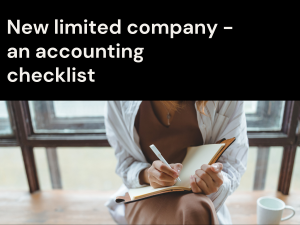The end of the year is always a stressful time for businesses and business owners. For new businesses, this stress can be even greater, especially if it’s the first time a business is filing its Year End accounts.
Remarkably data from Companies House in 2019 showed that businesses in London and Birmingham were the hotspots for late filing, with over 200,000 businesses facing expensive financial penalties for doing so.
At Raw, we want to help you avoid those fines and we know that with so much to do it can be easy to overlook all the things you need to be providing your accountant. That’s why we’ve given you the checklist we recommend to our clients at their Year End.
What are year end accounts?
Before we get started it’s important to define what we mean by Year End. For Limited Companies, the year end, also referred to as the accounting reference date, refers to the completion of an accounting period. This accounting period is usually 12 months.
For example, your business may have a financial year starting on 1st of December 2019, your year end would then be the 30th of November 2020, and your accounting period would run from the 1st of December through to the 30th of November.
To get your business prepared for your Year End and to avoid hefty fines from HMRC and Companies House, you’ll need to do the following things.
Prepare your expenses
Your first step will be to organise your expenses. Remember that you can claim expenses on things like:
- Office costs like stationery, paper and phone bills
- Travel costs, like public transport fares or petrol fees
- Clothing expenses, like uniforms and safety equipment
- Staff costs, like salaries or party allowances
- Claiming as many expenses as you’re entitled to means that you can reduce your company profit figure, which will lower your Corporation Tax.
Remember that as tempting as it may be to make an expense claim on everything you can, HMRC will only honour claims that it can see have been used solely for business purposes.
Chase up unpaid invoices
Unpaid invoices can skew a business’s figure at the end of their accounting year. To lessen the chance of this happening, ensure that your invoices are paid. Chase up unpaid invoices persistently until you have collected the money.
Once your invoices are paid, record and reconcile them into your accounts before the year end. This can be made easier with software, or if you don’t have the time, trusted accountants can follow up on and reconcile invoices on your behalf.
Make a note of important deadlines
Company Tax Return (CT600)
The HMRC deadline for filing a Company Tax Return (CT600) is 12 months after the end of the accounting period that it covers. Ultimately that means that if your Year End ends on the 31st of December 2020, you would have until the 31st of December 2021 to file.
However, it’s best to not leave it that long. For one, it could be very easy to forget and secondly, it’s best to submit it early so that you know what your tax bill will be and to avoid paying a penalty for missing the deadline.
The CT600 penalties aren’t cheap, and range as follows:
- £100: if the filing date is missed
- £100: If after 3 months you still haven’t filed
- £500: If you consecutively file later across a 3 year period
HMRC late penalties are something that businesses will want to avoid, especially because they increase in cost. It’s also worth noting that if statements are filed late for two years in a row, the Companies House penalties double. Though businesses can apply for extensions, it’s important to get the filing completed on time to avoid any black marks – and working with a professional accountant can help with this.
Corporation Tax
Whilst the deadline for filing your tax return may be 12 months after your year end, the deadline for either paying your Corporation Tax or informing HMRC there is none to pay is 9 months and 1 day after your Year End.
That’s another reason to get your company tax return completed and filed early, as you will need this to know how much to pay.
Companies House
The Companies House deadline also varies. If it’s your business’s first set of accounts filed with Companies House, they are due 21 months after the day your business is registered at Companies House.
For all your regular annual accounts afterwards, they are due 9 months after your business’s Year End.
Reconcile bank transactions
It’s critical to double-check that the transactions recorded in your bookkeeping program are identical to those shown on your bank and credit card statements. To accomplish this, you’ll need to perform bank reconciliations.
It’s considerably easier to do bank reconciliations when you use accounting software like Xero or QuickBooks Online. Make sure your recorded transactions are in line with credit card statements, bank statements, invoices, and receipts. At the end of the year, be careful to balance every penny as your accountant will need details of the year end bank balances.
File the relevant documents with HMRC and Companies House
Finally, your final step in your accounting checklist is to compile the following documents for submission to HMRC.
Company Tax Return
A few days after your Year End HMRC will usually issue a “Notice to Deliver Tax Return”. This is the CT600 and it can be filed online. It will contain the important details of your business, such as company income, allowable expenses and any tax allowances.
The Corporation Tax figure you must pay will be calculated by HMRC in accordance with how much profit your business has generated throughout the year.
Statutory Accounts
Statutory accounts are more commonly referred to as Annual Accounts. These are the accounts prepared from your business’s Year End financial records.
Your statutory accounts must include financial statements such as:
- Your profit and loss account, also called profit and loss statement which summarises the businesses revenue and expenses, whilst listing all the money which has been gained and spent throughout the year. The income statement will display the company’s income by evaluating its revenue, tax expenses, depreciation and cost of goods sold.
- Your balance sheet. This balance sheet must display everything the company owns, as well as everything it owes and is owed at its year end. The name of the director(s) must be clearly printed on it and it must be signed by the director(s).
- Accounts payable. Both your accounts payable and accounts receivable should be reviewed to ensure that all collections and obligations have been settled. Check for missing invoices in accounts receivable and contact any customers who have late or unpaid payments.
- Footnotes on your accounts. Footnotes simply refer to information regarding any transactions between the business and its director(s).
- A director’s report.
- Evidence of relevant documents filed with Companies House
As well as your business’s statutory accounts being submitted to HMRC, they must also be submitted to Companies House. A majority of companies will submit these together when initially filing with Companies House.
For small businesses or micro-entities, ‘filleted’ accounts may be able to be submitted to Companies House. These are simply accounts that contain a smaller, simplified balance sheet with any footnotes, and no compulsory option to send a director’s report or profit and loss accounts.
Cash flow statement
The cash flow statement summarises the money inflows and outflows for operational, investing, and financial activities of a company over a certain time frame. It may show when money enters and leaves a business. It can also indicate if a firm’s cash flow is healthy, with higher earnings than expenses. It’s not compulsory, but can be useful to understand where the cash goes.
That’s it!
Once you’ve organised your expenses, chased up invoices, reconciled your accounts and got all your paperwork together ready to submit to the relevant institutions at the correct date, your business is ready to officially start its new accounting year.
At Raw Accounting we understand that new directors especially can feel overwhelmed at the initial year end, especially when there is so much to do to successfully run your business day-to-day. If you need assistance at this time of the year, contact us today to see how we can help you with your small business accounting and bookkeeping as limited company accountants.






